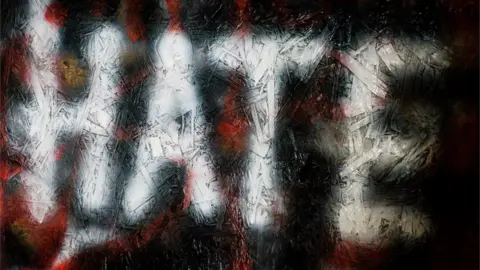Hostility to men and elderly people could become hate crimes
 PA
PAHate crimes are offences motivated by prejudice against someone's disability, race, religion, sexual orientation or transgender identity.
But should other so-called "protected characteristics" be included as well?
Last month, it was announced that a review by the Law Commission would look at whether offences driven by misogyny - dislike, contempt or ingrained prejudice against women - should be treated as hate crimes.
And now it's emerged the same review will also consider the opposite - crimes motivated by misandry - hostility towards men.
Ageism and hatred of certain alternative cultures, such as Goths or punks, could also be included in future.
What's behind this?
The Law Commission - an independent body that looks regularly at laws and whether they need to be updated - began its review of hate crime following a campaign by the Labour MP Stella Creasy.
She wanted misogyny to be recognised in the same way as racial or religious hatred because of the high levels of harassment that girls and women suffer.
As for why hostility against men is being included too, Home Office Minister Baroness Williams says the government always responds to what "the public and other organisations are telling us". And it appears at least some feel misandry is an issue.
She said the government wasn't telling the Law Commission to recommend that misandry be included, but was simply asking for its view on the matter.
"It may well be that particular strand is not necessary to take forward, but we are asking them to look at it," she added.
What are the implications of this?
Hate crimes include verbal abuse, physical violence and offences against property, like graffiti or arson.
They're known as aggravated offences, meaning they can attract longer prison sentences than similar crimes not motivated by hate.
Those stiffer penalties reflect the fact that hate crimes not only affect individual victims, but spread fear among the group to which the victim belongs.
However, the BBC's home affairs correspondent Danny Shaw says widening the definition could lead to a feeling that the impact of such offences is trivialised or minimised because there are so many different categories.
It also runs the risk, he points out, of sentence inflation because many crimes currently treated as public order offences would be reclassified as more serious - and so would attract longer jail terms.
How big a problem is hate crime?
Last year, the number of hate crimes in England and Wales was at a record high - more than 83,000.
All the indications point to a further significant increase this year - figures will be released on Tuesday morning - though some of the rise is because victims are more willing to report what's happened.
The charity Action on Elder Abuse said the inclusion of ageism as a motivation for hate crime was long overdue given the scale of the problem.
"The number of convictions for these crimes is tiny and, even when someone is found guilty, they often escape with flimsy sentences and paltry fines that do nothing to deter would-be abusers," chief executive Gary FitzGerald said.
What else is new?
The government wants more people who witness hate crimes to recognise them as such and then report them.
So, it's pinpointing several groups it thinks are more likely then average to become witnesses.
Taxi drivers are one. Door staff are another.
The latter will also be given guidance on how to ensure transgender people have a safe and enjoyable night when they visit pubs, clubs, events and festivals.
Home Secretary Sajid Javid said: "Hate crime goes directly against the long-standing British values of unity, tolerance and mutual respect - and I am committed to stamping this sickening behaviour out."
